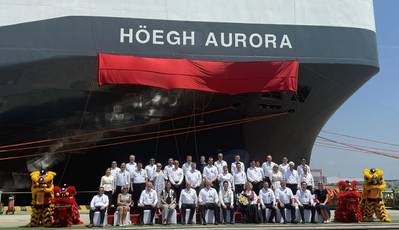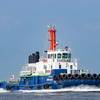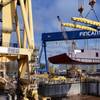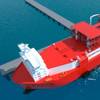World's Largest Car Carrier Höegh Aurora Delivered
The lead ship of Höegh Autoliners' Aurora class, Höegh Aurora, was delivered at a naming ceremony at China Merchants Heavy Industry’s (CMHI) shipyard in Jiangsu, China, on Tuesday.
The newbuild is the first of 12 Aurora Class vessels being built by CMHI. Featuring 14 decks—including five liftable decks—the ship can carry up to 9,100 CEU, making it the world's largest pure car and truck carrier (PCTC) vessel. With enhanced decks and ramps, the vessel is designed to carry electric vehicles on all decks, and will be very flexible for most cargo.
Designed by Deltamarin, the Aurora class vessels are described as the world’s most environmentally friendly PCTCs. The ships will be powered multi-fuel engines from MAN Energy Solutions that can run on marine gas oil (MGO) and liquefied natural gas (LNG). They also have DNV’s ammonia ready and methanol ready notations, meaning they are prepared to run on zero carbon fuels such as ammonia or methanol once these become more widely available.
According to Höegh Autoliners, the vessels will cut carbon emissions per car transported by up to 58% from the current industry average, and the company said it estimates that the Aurora class will reduce carbon emissions by approximately 10,000 MT of CO2 in one year (tank-to-wake) and around 6,200 MT CO2eq (well-to-wake).
The first Aurora Class vessels—including the Höegh Aurora, set to commence commercial operations immediately—will initially run on LNG, biofuels and low-sulfur oil. Looking ahead, Höegh Autoliners said it aims to have the last four of the 12 Aurora class vessels running on green ammonia from 2027, eliminating nearly all carbon emissions.
Höegh Autoliners has lined up several partnerships with ammonia producers such as Yara Clean Ammonia, Norwegian North Ammonia and Sumitomo Corporation, to ensure fuel supply supply. The company has committed, to powering at least 5% of its deep-sea operations with green ammonia by 2030.
“With the Aurora Class, we are pioneering efforts to combat pollution in a hard-to abate segment. We are setting new standards for sustainable deep-sea transportation, making a significant stride toward our 2040 net zero emissions goal. As the largest and most environmentally friendly PCTCs ever built, the Aurora Class vessels embody the change our industry needs. This achievement would not have been possible without the support of the Norwegian maritime cluster, our trusted partners, and our investors. We are grateful for their invaluable contributions to this project,” said Andreas Enger, CEO of Höegh Autoliners.
The Aurora class ships will be equipped with a wide array of modern maritime technology, including state-of-the-art safety and digitalization solutions and a bridge system supplied by Kongsberg Maritime. Each will have 1,500 square meters of solar panels on the top deck, reducing electricity production from the generators by up to 30-35% as well as the vessels being primed to embrace electric shore power for emissions-free port operations. All will be registered under the Norwegian flag.
“We have progressed from the initial idea to having the finished vessel in commercial operation in under four years—a record speed that attests to the exceptional effort from our employees and partners, whom I sincerely thank. The Aurora Class is the crown jewel of our groundbreaking, industry-transforming green fleet renewal program. These vessels meet the demands of our growing number of carbon-conscious customers seeking emission reductions and sustainable transportation,” said Sebjørn Dahl, COO of Höegh Autoliners.
Höegh Autoliners expects delivery of two Aurora vessels every six months starting from the second half of this year.
Following the 12 Aurora Class vessels currently on order, Höegh Autoliners has an option to build another four vessels (vessels 13-16), as well as slot reservations for additional four vessels (vessels 17-20).
Höegh board chair, Leif O. Høegh, said, “Together with our partners, we are removing carbon from one of the hardest-to-abate sectors. Changing the perception of deep-sea transportation. Together, we are making sustainable shipping doable, accelerating the green transition within our industry and setting a whole new standard for sustainable solutions and services in shipping. Höegh Autoliners have always innovated, explored new ways and changed the future for the better. That is who we are. The Aurora Class is probably our most impactful innovation yet.”















